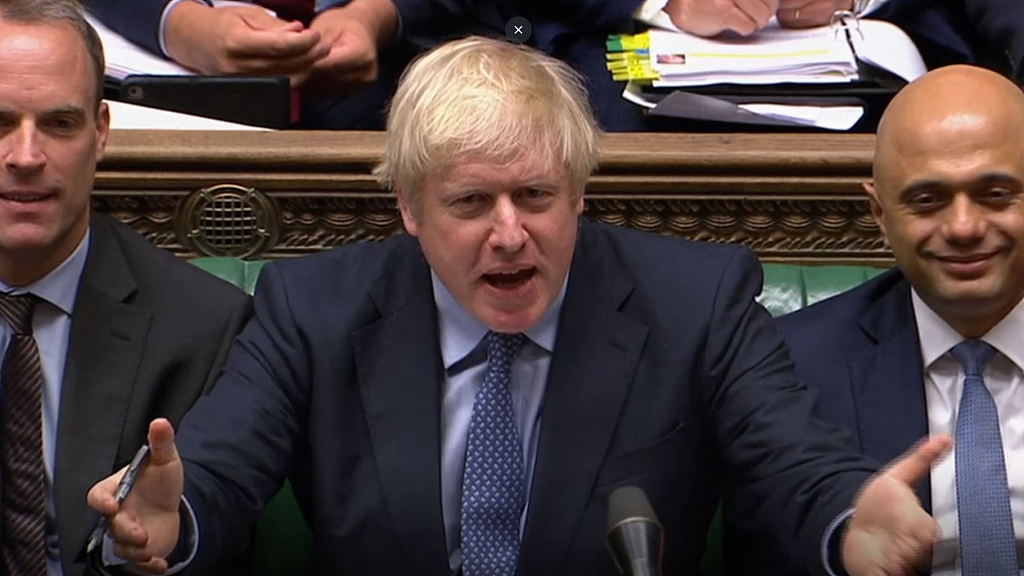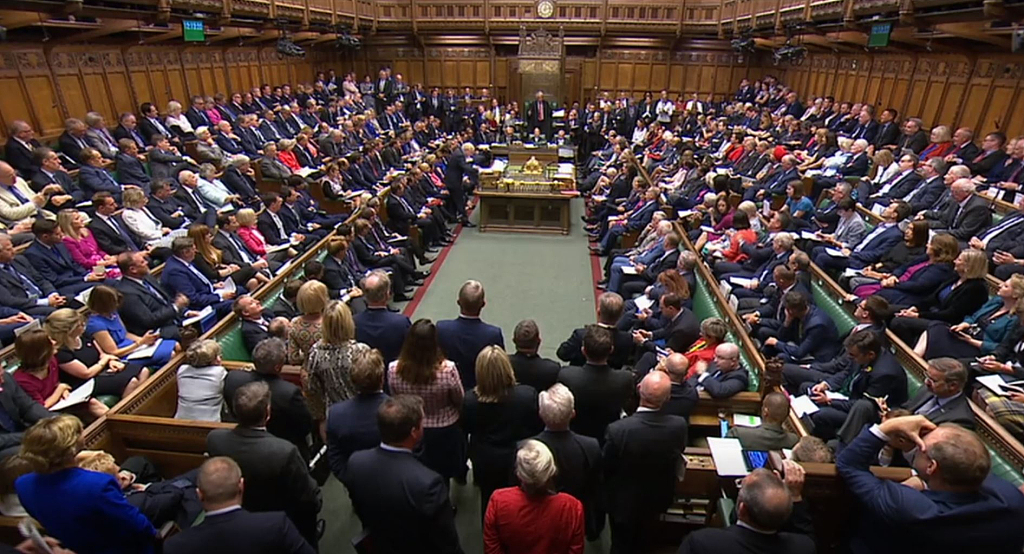

Editor's note: Ian Buruma is the author, most recently, of A Tokyo Romance: A Memoir. The article reflects the author's opinions, and not necessarily the views of CGTN.
The idea that British Prime Minister Boris Johnson is a man of the people, a tribune of the common man fighting the established elites, might seem anomalous, even outright bizarre. After all, Johnson is a perfect example of the English elite: educated at Eton and Oxford, and possessed of all the exaggerated mannerisms, in speech and demeanor, of the British upper class. As a journalist and Member of Parliament, he has been mischievous and frequently dishonest, but always a committed voice of the Conservative establishment.
And yet, here he is, pretending to represent “the voice of the people” against the voices in Parliament, which, from left to right, oppose his hardline approach to Britain’s divorce from the European Union. It has been a feature of the Brexit campaign to paint all who oppose an abrupt and complete withdrawal from the EU as enemies of the people. Since the people spoke in the 2016 referendum, any attempt to soften Brexit’s negative consequences by compromising with the EU, or postponing the break, is portrayed as an assault on the people’s will.
Johnson is facing massive opposition in Parliament, especially after his decision to suspend Parliament to deliver Brexit on October 31, deal or no deal. On Tuesday, after former minister Phillip Lee defected to the Liberal Democrats, he even lost the Tory majority of one. Making matters worse for him, Parliament voted to take away the prime minister’s control of the Brexit agenda. Tories who voted for the motion have been purged. This will almost certainly result in a general election, which Johnson will frame as a battle between “the people” and “the politicians” who stand in his way.
Johnson’s moves have been extraordinary, but not illegal. They are certainly not conservative in the sense of protecting traditional norms or the established order. What is more, they are very un-British. Some alarmed commentators see parallels with the rise of fascism. In fact, Johnson, as a scholar of the classical world, must be aware that the model of the upper-class demagogue gaining power by stirring up the angry passions of aggrieved plebeians goes back to the late Roman Republic, when people’s tribunes attacked the patrician Senate, often by inciting violent mobs. There was, no doubt, much wrong with the privileges of the senatorial establishment, but such demagoguery spelled the end of the Republic and the beginning of imperial dictatorship.
Referendums are hardly a British custom, either. When Winston Churchill suggested having a referendum in 1945 on prolonging his wartime government, the Labour leader Clement Attlee denounced the idea as “alien to all our traditions.” Mussolini was a great proponent of referendums, as are most dictators. Plebiscites are seen in closed systems as a form of “direct democracy,” when the will of the people supposedly finds its purest expression in the will of a great leader.
But the whole point of parliamentary democracy, of which Great Britain has been one of the earliest and proudest examples, is that it is indirect. The idea of the state representing the will of the people is a French Jacobin notion, which has always been rejected by British conservatives, starting with Edmund Burke. There is no such thing as “the people” in a parliamentary democracy, let alone one popular will, or one single popular voice. Politicians are chosen to represent different interests, which can then be debated in parliament in the hope of arriving at solutions through compromise.

Members of Parliament during Prime Minister's Questions in the House of Commons, London, September 4, 2019. /VCG Photo
Public opinion, too, in a liberal democracy, is more a form of representation than direct expression. For the last few hundred years, public opinion was voiced in the press, written or broadcast, and mediated by journalists and editors. This has changed, of course. Thanks to the Internet, most opinions are now entirely unmediated, and the people now have hundreds of millions of voices. Professional journalists seem obsolete, and like politicians, they are widely viewed with distrust – elitist purveyors of “fake news,” the “lamestream media.”
This is not to say that journalists or politicians are all fine people with sound opinions. Far from it. But we have already seen how much more easily, in an unfettered media landscape, people’s voices can be manipulated by demagogues and crooks in an unmediated free-for-all. By undermining Parliament in one of the most important political debates of the century, Johnson poses the same dangers to liberal democracy that populist agitators did to the Roman Republic.
There are many disreputable aspects of the Brexit campaign: stoked-up fears of immigrants, delusions of national grandeur, and so on. The more respectable argument revolved around the question of sovereignty. The EU is not a democratic state. EU membership means that certain laws are proposed and enacted by people who have not been directly chosen in national elections. There is a purist case to be made that a liberal democracy cannot delegate law-making powers to supranational institutions without watering down national sovereignty.
In fact, some of the laws that seem most irksome to Brexiteers are national, not European at all. But the point would not be whether laws are good or bad, but who has the right to make them. Certain British patriots see absolute national sovereignty as the core of their democratic system, exemplified by the Mother of Parliaments. But when they fetishize the will of the people expressed in a referendum, they become defenders of a very different political tradition, which is inimical to the British parliamentary system.
If Johnson, an unelected prime minister, and his increasingly rabid supporters choose to “take back” their country by setting up a conflict between the people and their political representatives, they risk destroying the greatness of Britain. Furthermore, by alienating the Scots, who might choose to make their own national way, and possibly also the Northern Irish, they literally jeopardize the United Kingdom itself.
Copyright: Project Syndicate, 2019.
(If you want to contribute and have specific expertise, please contact us at opinions@cgtn.com.)

Copyright © 2018 CGTN. Beijing ICP prepared NO.16065310-3
Copyright © 2018 CGTN. Beijing ICP prepared NO.16065310-3